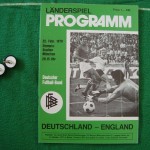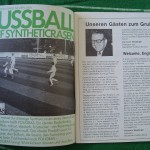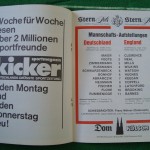Friendly International
Olympiastadion, München, 22.02.1978
![]()
2-1 (0-1)
Worm 79., Bonhof 86. / Pearson 41.
Germany: Maier – Vogts (c), Zimmermann – Bonhof, Schwarzenbeck, Rüssmann – Abramczik, Flohe (33. Burgsmüller), Hölzenbein (75. Worm), H. Neumann (72. Dietz), Kh. Rummenigge
England: Clemence – Neal, Hughes, Watson, Mills – Wilkins, Keegan (c) (82. Francis), Brooking – Coppell, Pearson, Barnes
Colours: Germany – white shirts, black shorts, white socks; England – red shirts, white shorts, red socks
Referee: Franz Wöhrer (Austria)
Assistants: Adolf Mathias, Franz Latzin (Austria)
Yellow Cards: – / –
Red Cards: – / –
Attendance: 78,000
Match Programme Details
The official match programme for the 1978 friendly in München was a compact A5-sized publication consisting of thirty-eight black and white pages. Priced at one Deutsche Mark, the cover image was of Karl-Heinz Rummenigge scoring the winning goal in Germany’s previous home international in Berlin against Italy.
The programme contains a welcome statement in both German and English by DFB President Hermann Neuberger, an interview with Nationaltrainer Helmut Schön, an overview of previous matches between the two teams and player details.



Aspect: Portrait
Dimensions: 210 x 148 mm (A5)
Numbered Pages: 38
Language(s): German, welcome text in English
Match Report
England arrived in Germany in 1978 on the back of yet another failure: having missed out on both the finals of the 1974 World Cup and 1976 European Championship they also fell short in their qualifying group for the 1978 World Cup in Argentina, losing out on goal difference to Italy. The head to head record between the two sides had been identical with each of them recording 2-0 home victories, but England’s failure to rack up the goals against the groups two weaker sides Finland and Luxembourg had been the difference between qualification and sitting out their fourth major international tournament in a row.
While England were starting to look to the future under new manager Ron Greenwood and the introduction of new blood, Germany as reigning World Champions were looking at finalising their side for the finals in South America. It was not greatest German side of all time: Nationaltrainer Helmut Schön had still not successfully managed to find suitable replacements for the likes of Franz Beckenbauer and Gerd Müller, and while there were a number of talented youngsters – such as Karl-Heinz Rummenigge and Rüdiger Abramczik – the rest of the squad were either reaching the end of their careers or Bundesliga journeymen.
Schön’s tactics had also been upset by the late withdrawal through injury of striker Klaus Fischer; the Schalke 04 man had been on a particularly hot run of form, scoring an almost Mülleresque eleven goals in nine games for the Mannschaft since his debut the previous year at the age of twenty-seven. Fischer had been assigned the number nine shirt in the match programme, but at kick off he had been replaced by the veteran winger Bernd Hölzenbein – whose goalscoring record was nowhere near as comparable.
As both sides attempted to find their feet in the opening exchanges, it was pretty clear that Germany were missing the recently-retired Beckenbauer at the back. His vision and guile had been intrumental in much of the success the Mannschaft had enjoyed during the early part of the decade, and there was a distinct lack of vision and pace. The midfield was also somewhat stodgy, and the two young wingers were for the most part left isolated. England meanwhile had begun brightly, quickly asserting themselves in the middle of the park.
The first efforts on goal came from the men in red, first from Ray Wilkins’ looped effort that fell safely into the arms of Sepp Maier, and then the dynamic young winger Peter Barnes, who shot narrowly wide. Although England had established a distinct supremacy with their pace and tight marking it was the home side that engineered the first decent opportunity to open the scroring on the half-hour mark, as the young Schalke 04 winger Abramczik shot narrowly wide. Less than two minutes later, Abramczik combined brilliantly with Heinz Flohe and Karl-Heinz Rummenigge – with the young Bayern man showing great skill in remaining upright when it would have been a lot easier to go down for the foul.
These encouraging moments for the home side were followed by an equally good spell for the opposition, with the speedy Barnes working his way down the left and engineering a superb cross for Manchester United’s Stuart Pearson, who directed his header wide of the target. Less than two minutes later however England had taken the lead. With play seemingly going nowhere down the right flank, Phil Neal played a short pass back to winger Steve Coppell, who floated a hopeful looping ball into the box. It was met brilliantly by Coppell’s club team-mate Pearson, who rose above Rolf Rüssmann and nodded the ball in off the far post with Maier well beaten.
England were good value for their lead, but with the exception of the short bright spell around the half hour mark Germany had given the home crowd little to cheer about – they were unceremoniously whistled off the field.
The first ten minutes of the second half saw what could best be described as sparring session between the two teams, with much of the play being made in midfield. The crowd had become increasingly restless, their ire being stoked by a succession of badly-directed passes. In what was perhaps an apt summary of the German game, left-back Herbert Zimmermann’s attempted shot on goal managed to find Rainer Bonhof on the right-side touchline. It was not quite Geoff Thomas circa 1992, but getting there.
With just over an hour gone a German corner came to nothing, and the play quickly moved to the other end of the field. Ray Wilkins put Kevin Keegan through, but he could only get a soft touch on the ball which rolled into the arms of Sepp Maier. Knowing that they could have very easily been two goals down, the men in white finally upped the ante. On sixty-six minutes a long high ball into the box from skipper Berti Vogts – not dissimilar to Coppell’s effort that led to England’s goal – caused pandenomium among the gaggle of red-shirted defenders. The ball fell to Rüssmann, who swivelled neatly before unleashing a right-footed effort that missed the target by a whisker.
With the home side starting to at last show some signs of life, Schön made two substitutions in the space of three minutes. First the injured debutant Herbert Neumann was replaced by the more experienced Bernard Dietz, and then the disappointingly anonymous Bernd Hölzenbein made way for Dietz’s MSV Duisburg team-mate Ronald Worm. In a situation that would never happen today, Worm had scored the previous evening in the B-international between the two sides which Germany had lost 2-1.
Less than a minute after coming onto the field, Worm was already causing chaos in the opposition box, with Rummenigge shooting wide of the near post with England ‘keeper Ray Clemence beaten. While the chances were finally starting to come, it just didn’t look as though it was going to be the Mannschaft’s night.
Then, the breakthrough. With just over ten minutes left in a game where they had offered little, Germany were back in it. Abramczik picked the ball up in midfield, and laid it back to Rüssmann who in turn found Ronald Worm. Worm then played the ball inside to Dietz, who almost accidentally delivered a return ball as his marker brought him down. With only the keeper to beat and his eyes on the target, Worm calmly stroked a left-foot shot across Clemence and into the far side of the net. 1-1.
As full-time approached, the dynamic of the match had clearly swung in favour of the home side: quite literally, Worm had turned the match on its head. With just over five minutes left, substitute Manfred Burgsmüller was clattered just outside the box by Dave Watson; chaos ensued as Rolf Rüssmann’s attempt to take the kick quickly sent the ball straight to Ray Clemence, only for the Austrian referee to call play back. With the ball positioned just inside the D, Rainer Bonhof took control of the situation. Taking a long run-up, he somehow managed to find the sliver of space between the wall, Clemence and the post; the England players protested, but to no avail: from nowhere, Germany were suddenly in front.
With less than five minutes remaining, England desperately pressed forward for an equaliser but didn’t look like scoring. If anything, Germany could possibly have scored a third on the break as Abramczik blazed a shot high over the crossbar. The game was up, and Germany had won a game that for seventy-five minutes they had seemed destined to lose.
While Helmut Schön and his side celebrated a narrow and perhaps undeserved victory, Ron Greenwood’s side were left having to consider what might have been. It had been a close result, and this England side had clearly turned the corner. They would once more start to make the finals of the major international tournaments, and the next meeting between the two sides would come four years later – at the finals of the World Cup in Spain.
Cumulative Record
Home: played 10, won 2, drawn 3, lost 5. Goals for 13, goals against 24.
Away: played 7, won 1, drawn 0, lost 6. Goals for 6, goals against 23.
Neutral: played 1, won 1, drawn 0, lost 0. Goals for 3, goals against 2.
Overall: played 18, won 4, drawn 3, lost 11. Goals for 22, goals against 49.
Competitive: played 4, won 2, drawn 1, lost 1. Goals for 8, goals against 7.
